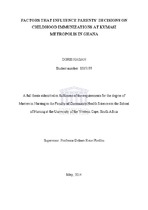| dc.description.abstract | This study sought to explore and describe factors that influence parents’ decisions on childhood immunizations at Kumasi Metropolis in Ghana. Based on the Health Belief Model used as the theoretical framework guiding this study, immunization decision making is influenced by one’s knowledge on immunizations, perception on immunizations and sociodemographic factors. With an exploratory descriptive quantitative cross-sectional survey, a sample of 303 parents was obtained from five district hospitals in Kumasi metropolis. This was done through convenience sampling of participants at immunization sessions. Structured questionnaires were developed in line with the study’s objectives, literature review and theoretical framework. Data obtained from the survey were analysed with the computer-based facility of SPSS version 21 software. This enhanced the application of descriptive and inferential measures to present the results in graphs and tables. Findings from the study showed that most parents were aware of immunization but had limited knowledge on vaccines and immunization schedule. It also revealed that antenatal nurses constituted the most accessible source of information. Furthermore, the study established a high percentage of complete immunization, influenced by parents’ fear of their children contracting vaccine preventable diseases. However, the few parents who could not complete the immunization schedule for their children referred to challenges such as forgetfulness and lack of personnel or vaccine at the centre. Whereas the socio-demographic variables considered did not influence their decision on immunization, it was established that the percentage of complete immunization increased with increasing schooling level of parents. It was higher among Christians than Muslims. The study concluded that knowledge on immunization could not influence immunization decisions. However, the main factors that influence parents’ decision on childhood immunizations in Kumasi metropolis were parents’ fear of vaccine preventable diseases, awareness on the benefits of immunizations and sources of vaccine information | en_US |

